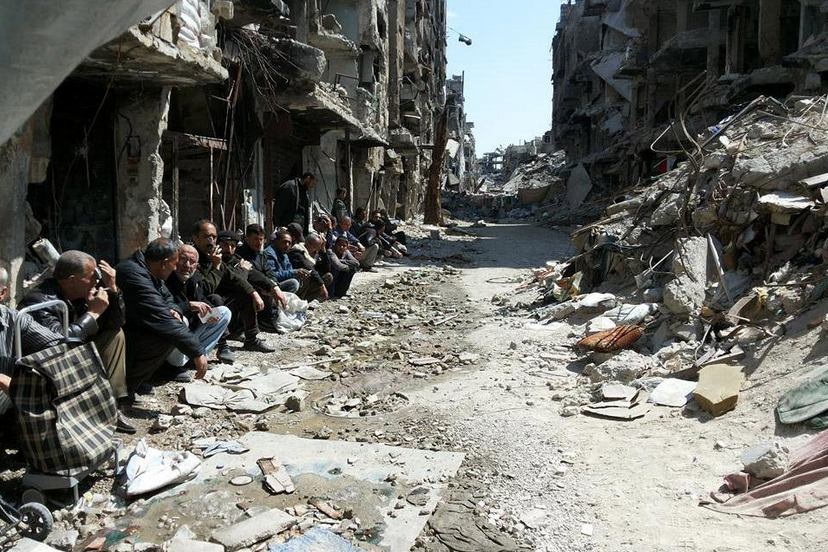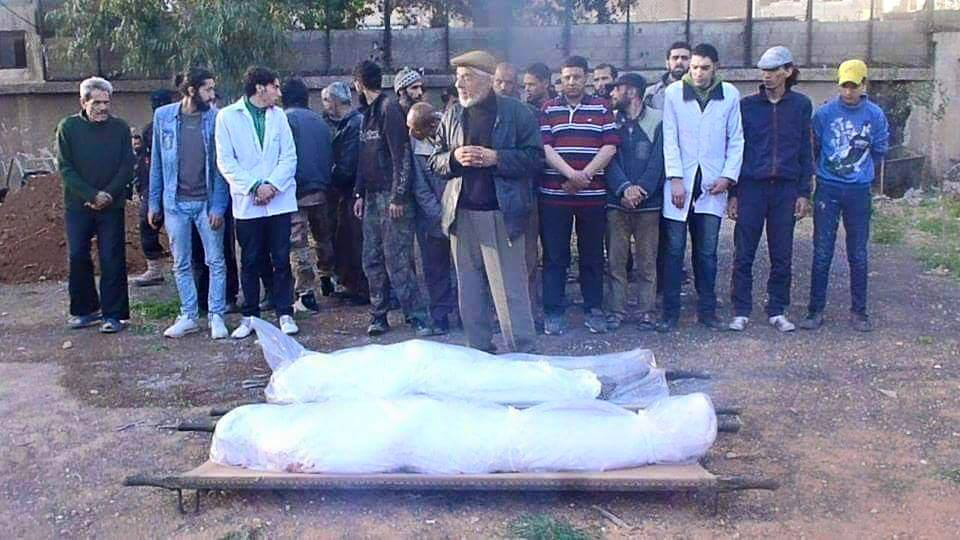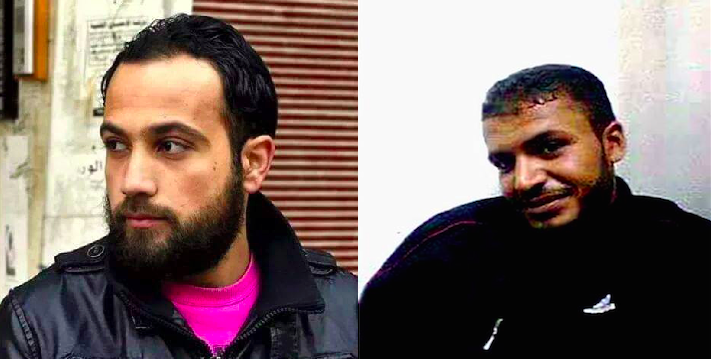
Residents of Yarmouk Refugee Camp in Damascus, Syria. Photo: UNRWA/Walla Masoud
The situation in the Yarmouk Palestinian refugee camp in Damascus, Syria, has reached catastrophic levels, according to the United Nations Relief and Works Agency for Palestine Refugees in the Near East (UNRWA). It is still hard to properly estimate what exactly is going on in the camp, but reports by local activists suggest that a large part of the camp has been overrun by ISIS and Jabhat Al Nusra, an affiliate of Al Qaeda, who are both fighting Palestinian and Syrian militias in the camp.
To make things even worse, the Syrian government has been bombing the area since Sunday according to both local activist Hatem al-Dimashqi and the London-based Syrian Observatory for Human Rights, which tracks the Syrian conflict through a network of local activists.
In an official statement, Pierre Krähenbühl, the Commissioner-General of UNRWA, said that the situation in Yarmouk is “more desperate than ever”, adding that as of now it is “simply too dangerous to access Yarmouk”. There are currently 18,000 civilians trapped in Yarmouk, among whom are 3,500 children, living in horrific conditions. “Right now, what is on the mind of people at Yarmouk is bare survival,” he added. Tweeting from Jordan, Krähenbühl is calling on the international community to act immediately to save the civilians of Yarmouk:
Time for int'l mobilization to save Palestinian and Syrian civilians in Yarmouk. Call on world leaders to act before too late. #SaveYarmouk
— Pierre Krähenbühl (@PKraehenbuehl) April 5, 2015
Bloodshed in Yarmouk appalling. Credibility of int'l system tested. World political, religious & other leaders must act 2 #SaveYarmouk RT
— Pierre Krähenbühl (@PKraehenbuehl) April 5, 2015
Speaking to Germany's Deutsche Welle, Christopher Gunness, spokesman for UNRWA, described the situation as already catastrophic even before current escalation, saying that “Yarmouk was already a place where women had died in childbirth for lack of medicine, where children had reportedly died of malnutrition. So things were already appalling. Last September we had the main water supply into the camp destroyed. So people are heavily dependent on the supplies of UNRWA. Things were absolutely inhumane. Yarmouk was a hell hole frankly. And with the eruption of this intense fighting, things got dramatically worse.”
The current inaccessibility of Yarmouk is already having terrible consequences on the civilians trapped there, and as of now it is impossible to properly estimate the damage. According to Yarmouk-based Hakim Said who spoke to “Syria Direct” last month, prior to ISIS’ takeover, the aid sent by UNRWA is far from being enough to sustain the civilians, who are already heavily dependent on UNRWA for survival – 95 per cent of the Palestinian population in Syria is completely dependent on UNRWA. “We are not satisfied because we do not know when we will get more aid packages”, he said. “We will finish the ones that we just received within a week. The amount of bread is not enough for more than for two days.”

Funeral of two killed by shelling inside of Yarmouk refugee camp in Syria, April 2015. (Photo: Jafra Foundation for Youth Development and Relief)
Among the armed groups fighting ISIS and Nusra are Jaysh al-Islam and, most importantly, Aknaf Beit al-Maqdis. Speaking to The Guardian, a Jaysh al-Islam spokesperson claimed that his group had killed 80 ISIS fighters and that they “can definitely repel the assault.” Furthermore, in an official statement published on Twitter, Aknaf Beit Al-Maqdis said that it is fighting ISIS and Nusra:
أكناف بيت المقدس تصدر بيان صحفياً تؤكد فيه استمرارها بالدفاع عن #مخيم_اليرموك ضد هجوم #داعش المدعومة من #جبهة_النصرة pic.twitter.com/V0C5hprUq6
— مجموعة العمل (@actgroup_pal) April 4, 2015
“In the name of God, the Most Gracious, the Most Merciful, […] your brothers, Aknaf Beit Al-Maqdis is confronting the barbarian attack on the Yarmouk camp by the criminal ISIS and in cooperation with Nusra for the past 4 days. […] We at Aknaf Beit Al-Maqdis are defending the capital of the Palestinian diaspora and the blood of our people […]
Jaysh Al Islam also released a statement, published on its English-language Twitter account, praising Aknaf Beit Al-Maqdis and condemning Nusra for its alliance with ISIS:
Statement about the recent developments in the Yarmouk camp pic.twitter.com/WchHaIVrNf
— Army of Islam (@IslamArmy_Eng) April 6, 2015
Writing on Mondoweiss, the Jafra Foundation for Youth Development and Relief, a Yarmouk-based humanitarian NGO, has chronicled the recent events between April 1 and April 4. In addition to information covered above, the Jafra Foundation has documented the killing of Yarmouk activists by both ISIS and the Syrian regime. Among the victims were Jamal Khalifeh and Majed Al Omari. Khalifeh, who was killed by regime shelling, was a 27-year-old media activist and co-director of a short film entitled ‘Siege‘ highlighting life under siege in Yarmouk. Majed Al Omari was a 21-year-old coordinator of Jafra's Team Services inside Yarmouk. He was killed on April 3 by ISIS forces, “shot by sniper fire in the street near his home”.

Left: Jamal Khalifeh. Right: Majed Al Omari. Photos: Jafra Foundation for Youth Development and Relief
Mohamad Bitari, the Spain-based spokesperson for the Network of Organizations of the Palestinian Civil Society in Syria and himself a native of Yarmouk, was interviewed by Global Voices’ Leila Nachawati for the Spanish daily El Diario. In the interview, he spoke of the situation on the ground. Here are a few extracts of his answers:
[…] La lucha se libra en varios frentes, contra ISIS y contra las fuerzas de Asad a la vez. Es durísima, pero no ha cesado […] El campo lleva dos años ocupado, aislado, con la gente muriendo de hambre, y a pesar de eso resiste. El régimen no ha conseguido someterlo y para justificar su destrucción total, hacía falta que entrase Daesh.
[…] The fight is happening on various fronts, against both ISIS and Assad's forces at once. It is very hard, but it hasn't stopped […] The camp has been occupied for two years, isolated, with people dying of hunger, and yet it still resists. The regime has not succeeded in submitting it and is using the entrance of ISIS to justify its complete destruction.
When Nachawati asked him if he was implying that Assad's forces joined forces with ISIS to “end Yarmouk”, he responded:
El día que entró ISIS al campo, aviones de Asad lanzaron durante horas entre quince y veinte barriles explosivos, además de decenas de cohetes. Todos se cebaron en zonas civiles, ni uno solo sobre las zonas por las que avanzaba ISIS. Es fácil de comprobar. Que estén oficialmente enfrentados no significa que no tengan objetivos comunes.
The day ISIS entered the camp, Assad's planes dropped between 15 and 20 barrel bombs for hours, in addition to tens of rockets. They were all concentrated in civilian areas, not one over areas in which ISIS was advancing. It is easy to verify. That these two have officially faced each other does not mean that they don't have common objectives.
Meanwhile in Palestine, both Gaza-based Hamas and West Bank-based Palestine Liberation Organization (PLO) have harshly condemned ISIS and are repeating UNRWA's call for international aid. Hamas held a rally in Gaza attended by hundreds with senior Hamas official Salah Al-Bardawil addressing them by saying “for the thousandth time: hands off the Yarmouk camp, hands off our people, hands off the slaughtered, killed and starved.” Meanwhile, Saeb Erakat, a chief Palestinian negotiator of the PLO, has said that there are “reports of kidnappings, beheadings and mass killings.. coming out from Yarmouk, which is under a brutal campaign of murder and occupation at the hands of the terrorist group of Daesh [Arabic word for ISIS] and its allies.”
And finally, activists involved in the struggles in both Palestine and/or Syria are expressing their anger on Twitter. Independent journalist Rania Khalek, decried the late international attention to Yarmouk:
Arabic media is talking about it nonstop, which isn't bad. But ppl have been trapped, starving & bombed in Yarmouk for years now.
— Rania Khalek (@RaniaKhalek) April 5, 2015
London-based activist Daniel Wickman listed to his 17,000+ followers a number of actors he accused of abusing Palestinians over the years:
Israel occupies them, Assad starves them, Egypt blockades them, the US smiles and lets it happen, and now ISIS joins in the fun. #Yarmouk
— Daniel Wickham (@DanielWickham93) April 6, 2015
Dubai-based Jenan Moussa tweeted to her 88,000 followers with the hashtag #SaveYarmouk:
Tragedy of Palestinian refugees in Yarmouk: 1st siege, then bombs, now ISIS. People need safe route out. #SaveYarmouk pic.twitter.com/XtVkanrP35
— Jenan Moussa (@jenanmoussa) April 5, 2015







9 comments
It appears that where ever the fanatics reach a critical there is nothing but, death, destruction and human misery. It’s about time they were held to account and dissolved from this practice.
Just finished writing a post “Yarmouk Camp Between Hunger’s Hammer and Extremism Anvil” we are on the same page Mr.
Rania Khalek above wants to know why the international community is only now paying attention. Because if the international community can’t blame the Jews, they aren’t interested. And this lady is at fault. Always blaming Israel and giving 20% of international aid to Palestinians, but only select Palestinians (Gaza and West Bank). Palestinians elsewhere get no aid.
The obsession with Israel has caused this. I give another example of how it harms Muslims. A few years ago, Kyrgyz and Uzbeks were killing each other in Kyrgyzstan, but the UN met to condemn Israel. These Muslims (Kyrgyz and Uzbeks) were complaining, where is the UN? Well, those same Muslims on any other day are happy to obsess over Israel and Jews. That’s what happens when you allow that obsession, when you need help, you don’t get it.
According to the UNRWA “When they do find relief from the conflict, they suffer marginalization and acute vulnerability. In Lebanon, Jordan and Egypt, many Palestine refugees from Syria do not have legal status and are unable to access civil registration procedures and basic social services.”
Maybe if this gets enough press people will start asking why there are still Palestinian refugees in Arab countries, Gaza and the West Bank? Maybe the Arab leaders will be forced to publicly admit what everyone else already knows, the Palestinian refugees will not be “returning” to anywhere and are destined to be victims for ever. Maybe, just maybe, they will call it what it is, Arab apartheid.